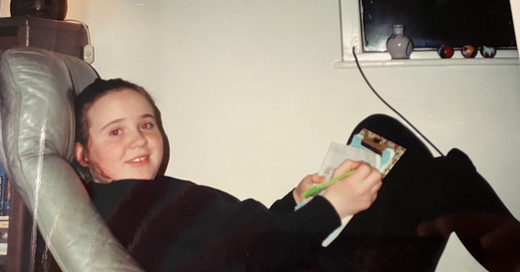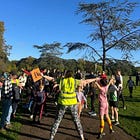The Worst Day of the Year
How can we make Sports Day less dreaded, whether you're an 8-year-old with an egg and spoon or a 38-year-old being roped into a company-wide rounders tournament?
It’s Sports Day season. Great! A day off maths! A chance to lark around outside, celebrate athletic achievements, get off your tits on Claritin and see your teacher in their best capri leggings!
OH GOD NOT SPORTS DAY.
For many kids it spells extreme dread. I was one of them. Even now, the memories send shivers down my spine — which once literally happened, because I got such severe sunstroke at Sports Day circa ‘91 that my mum had to write a strongly-worded letter to the school about perhaps providing some shade for sedentary children of conspicuously Celtic origins.
These days, I am the proud owner of two nice, not entirely sedentary kids of my own, and they’re not overly enamoured with the whole thing either. They don’t hate it like I did — which I’m giving myself a tiny pat on the back for, putting it down to my relentless role-modelling of “exercise makes you feel good and isn’t about winning!” — but their feelings about it are neutral to negative, because it still makes them feel a bit rubbish, as they are not “naturally sporty” and some of their friends are. While I cried actual tears about the prospect every year and desperately tried to find ways to get out of it, they’re just a bit eye-rolly about it.
The fact is, unless you are in the top 50% or so for athletic prowess, Sports Day, and school sports in general, make you feel like shit. Coming last in races, struggling to jump over stuff, being cack-handed at throwing things… at Sports Day, there are a multitude of things to be rubbish at, all while being watched over by your (in my case, lighter, lither, leggier) peers, as well as your teachers and parents — even if some of them are discreetly Airpodded into Teams calls at the same time, due to Sports Day generally happening at 11am on a Tuesday.
At least at primary school, most of the kids still feel comfortable in their shorts and t-shirts. At secondary school, it’s feeling like you’re making a deeply unsporty spectacle of yourself while also being horrifically conscious of your pasty skin, hairy legs, wonkily sprouting boobs, cumbersome bum and <insert your own pubescent insecurities here>.
It sounds like extreme paranoia until they’re literally shrieking “milk bottle legs” at you, cackling “your arms look weird when you run” (like a T-Rex, apparently) and asking why you don’t shave your legs yet (I remember secretly trimming them with nail scissors in the bath that night. I was only about 12, and so didn’t have a razor).
The fact is, lots of kids are mean, competitive and jealous — just like all of us are, but without the years of social conditioning to mask it. Schools try to get round this by putting kids in mixed ability teams for Sports Day rather than pitting them all against each other individually, but the trouble is sometimes the sportier team members visibly and audibly tut, sigh and even heckle at their less athletically-gifted teammates, and it’s horrible to witness. Sure, they get told off, but it doesn’t mean it didn’t happen and it doesn’t mean Unsporty Kid isn’t going to cry about it later and remember it FOREVER.
The argument is, of course, that Sports Day teaches kids about teamwork, sportsmanship and embracing personal strengths, as well as learning that you can’t always win. OK. But why do the less Bolt-esque kids have to be the victims of that particular character-building experiment? And when do they get to make the sporty kids feel like shit in response? Perhaps 30 years from now, revenge will be a dish best served cold when they get to ignore their request for a LinkedIn recommendation? Oh wait, except the sporty kids often end up running companies too, due to the high self-esteem and competitiveness that was nurtured in childhood when they first started winning plastic trophies at school.
Ah yes, adulthood. If you’re a corporate drone, Sports Days are often the go-to summer team-building solution. Low budget, time outside, and everyone loves it right? Bring on the rounders! Bring on the tug-o-war! Bring on the sprint! It’ll be just like school, except with Torres Black Truffle crisps and lukewarm M&S tinnies instead of Monster Munch and Capri Sun.
Remember, though, it’s not about the winning, it’s about the feeling really awkward in front of the moody graphic designer you have a proximity crush on.
The problem is, the people who organise team-building days tend to be lifelong members of the swishy ponytail brigade. They simply don’t know what it’s like to not be sporty. To paraphrase Trainspotting, I don’t hate them, they’re just wankers.
Even if they’re not wankers (it took until my thirties to stop writing people off as potential friends simply because they liked running), they often have no idea what it’s like to feel embarrassed just holding a ball, let alone throwing it. Usually they can do spontaneous bursts of activity without needing a sports bra or a stick of anti-chafing balm. Plus even if they insist they are “not very sporty haha!” they have never, ever come last, so it’s just an abstract concept and not something they’re currently discussing in therapy.
So, how do we fix this? How do we improve Sports Day for the kids of today so that they can blossom into adults who are casually comfortable being active? How can we stop British humans from being lumped into two camps: personality-definingly sporty, and health-compromisingly sedentary? And how do we deal with those two camps being mutually disgusted by each other — at least, until a handful of them have a midlife epiphany and get addicted to parkrun?
On that topic, why does my almost-10-year-old son love junior parkrun but hate running at school?
And why is a 100 metre dash the climax of a whole day of events anyway, the ultimate prize to covet, when little kids who can sprint fast were probably just born that way and haven’t actually trained for it whereas, conversely, coming last in that race is deeply, deeply conspicuous and feels like it’s loaded with negative traits?
What if kids could choose two or three events to enter instead of being roped into everything regardless of their preferences and abilities? What if some of those events were more about genuinely enjoying and celebrating fun forms of movement (and I don’t mean a fucking egg and spoon race)? What if progress and effort were celebrated as much as victory — by everyone, not just by that one, really kind and gentle teacher who’d probably rather be at home doing crochet? What if there were active spectator roles too, where kids could help officiate, time-keep, take photos, set up equipment, write race reports, design banners, cheerlead, play music? What if, basically, the whole thing felt more like London Marathon and less like an anxiety dream?
Because this is where it all starts. This is where our feelings about exercise are formed and can mutate into lifelong grudges and insecurities, where our darkest fears about our bodies are exposed, where we feel too slow, too heavy, too weak, too clumsy, too sweaty, to be seen. It’s exactly the same feeling we get when we book a gym induction at 39 because we heard that if we don’t strength-train our entire body will soon disintegrate and it’s exactly the same feeling we get when Swishy Sophie sends the company-wide email about “SPORTS DAY IN HYDE PARK 2025!!!”
(Btw, I’m not even going to veer into what Sports Day might feel like for children with neurodiversities or disabilities, because it’s not something I have personal experience of, but I’m sure someone else can Hot Take the shit out of it.)
Of course, for a privileged few, Sports Day is quite the opposite and I don’t want to take it away from them. Sporty kids should be encouraged. Cultivating those green buds of athletic talent can turn a shy child into a confident one, which is ultimately going to help make them a stronger, more successful human being, even if they don’t end up playing for Palace or hurdling for the county. But, if we really want to nurture a nation of more active citizens — and don’t be fooled by all your middle class mates joining running clubs, getting more people to be active is kind of a necessity right now — we need to find a way to celebrate and reward the sporty ones without it making everyone else feel like crap.
We all know how important exercise is for our health, both physical and mental. But school Sports Day doesn’t feel like it’s really about either of those things, and nor does it particularly promote endurance or strength either. I don’t have all the answers, but I’d love to hear about anyone doing it differently; schools or organisations who are successfully tackling alarming data like the fact that, according to Sports England research, less than half of kids in England are doing the recommended daily amount of exercise.
So no, I don’t want to cancel Sports Day, I want to rewire it. If we can shift the narrative for just one kid — maybe the one who’s contemplating forging a letter from her mum about a migraine that could turn fatal if she has to shuffle 50 metres with a beanbag on her head — we might just plant the seed of something that grows into a lifetime of moving, not out of fear or obligation, but habit and, ultimately, joy.
Or we could just stick with the current system and keep funnelling all the confidence into the same six children every year. I'm sure they’ll write excellent LinkedIn testimonials for each other in 2045, while the rest of us are still Googling “can an adult join netball if they’ve never caught a ball?”.










I used to hate sports day, but I think my school in the 00s had it right in some ways — for each event, every class sent someone (or a group) to compete and that meant we could choose if we got involved or not. Only snag was if you didn’t take part you had to sit on the tennis courts for hours on end, which provided no shelter from the sun whatsoever. I still remember my teacher remarking, “Why do they make everyone sit here? It’s like Guantanamo Bay!”
I absolutely empathise with every aspect of this! I was a keen bean, but average at best at basically everything sporty. Over my secondary school years, being slowly but consistently passed over for the hockey team, netball away matches or cross country competitions with other schools meant my enthusiasm slowly drained and my very academic parents delightedly resteered me in the direction of the STEM subjects. It took until basically my early 30s for my enthusiasm for sports to come back, and even then only because an old school friend described me as "sporty" at school, a term that took me totally by surprise. I'd never considered myself sporty because I wasn't competing at county level and earning trophies. So, basically, everyone loses, even those kids who actually LIKED athletics (tiny, anxiety-inducing-what-if-someone-sees-I'm-on-my-period athletics pants aside)